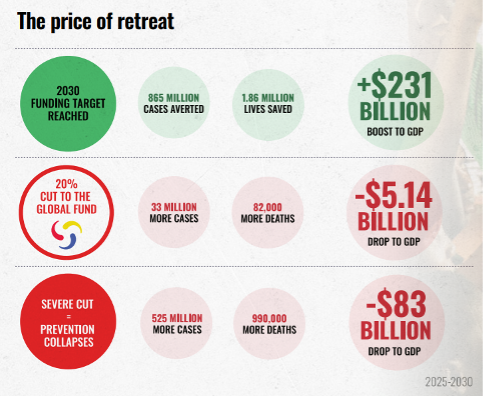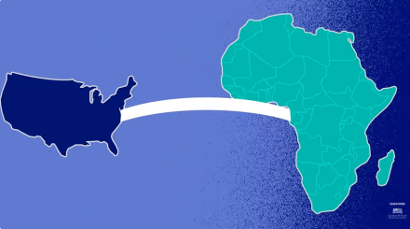Partnerships across Africa – from security, to governance, to investment, to development – must remain central to U.S. foreign policy.
Programs like the President’s Emergency Plan for AIDS Relief (PEPFAR), the President’s Malaria Initiative (PMI), and the Millennium Challenge Corporation (MCC) show how U.S. partnerships can advance American interests, save lives, and foster economic opportunity.
The George W. Bush Institute just launched the Unparalleled Partnerships with Africa series, which calls for renewed U.S. commitment to the continent amid growing Russian and Chinese influence. In the series, you can read more about the role that American investment and development must play to reinforce U.S. leadership in global health and strengthen Africa’s resilience and prosperity.
Figure of the Week
$115 million
South Africa welcomed the U.S. government’s approval of a $115 million PEPFAR bridge plan to sustain HIV prevention and treatment programs for six months, signaling a positive step in bilateral relations. The initiative will help stabilize services disrupted by shifts in U.S. foreign investment earlier this year. This will hopefully facilitate negotiations between South Africa and PEPFAR on multi-year bilateral compacts that will outline the U.S.-South African global health partnership for the next several years.
Ally Updates
Malaria No More U.K. and the African Leaders Malaria Alliance released a new report detailing how global underinvestment in malaria control risks triggering the biggest malaria resurgence on record that will cost lives, worsen economic strain on Africa, and disrupt global trade.
The cost of retreating from malaria investment is steep, as shown in the graphic below. With the upcoming eighth replenishment cycle for the Global Fund, the global community has the opportunity to preserve over two decades of progress in fighting malaria by strategically investing in health systems. If the Global Fund successfully reaches its 2030 funding target, sub-Saharan Africa can benefit from 865 million cases averted, 1.86 million lives saved, and a $231 billion boost in GDP.

Bush Institute Insights
Russia and China continue to expand their authoritarian influence across Africa, leveraging global health engagement to advance agendas that undermine regional stability, global security, and long-term prosperity. Their growing presence has exploited gaps left by years of reduced U.S. engagement, promoting interests that run counter to democratic governance and sustainable health development, such as predatory loans that divert resources from a country’s essential health services. Countries like Sudancontinue to face extreme atrocities and instability that is exacerbated by these interventions.
A strong, healthy Africa is not only essential to the continent’s growth but also to global peace, prosperity, and stability. The U.S. must reprioritize its engagement across the continent by expanding investment and development efforts that have directly stimulated opportunity and growth, including:
- PEPFAR, which has saved more than 26 million lives while strengthening health infrastructure, promoting good governance, and generating an estimated $1 trillion in economic benefit.
- MCC, which has lifted over 300 million people out of poverty through data-driven, results-based investments.
- PMI, which has prevented two billion malaria infections across African nations since 2000.
Targeted, transparent U.S.-led partnerships can strengthen security, economic growth, and democratic values across Africa. You can read more about the state of investment and development in Africa and policy recommendations from the Bush Institute’s Global Policy experts.
In the News
- In a recent piece for Devex, health ministers of four of the world’s highest-burden tuberculosis (TB) countries (Indonesia, the Philippines, South Africa, and Nigeria) outline mechanisms for ending TB. Tools like modern financing, national insurance and taxation plans, engagement with results-based financing development banks, leveraging private sector resources, and converting debt into domestic spending on health can eliminate the burden of TB. Every dollar spent on TB yields up to $46 in economic benefit. As the authors rightfully say, it’s time for countries to address the response to their own epidemics, so that their people can reap the rewards.
- Ghanaian President John Mahama is championing a new path towards health autonomy through the “Accra Reset,” a new framework for development that prioritizes self-determination in Africa. The framework calls for governments to define their own health priorities while engaging partners, from U.N. agencies to the private sector, to co-design solutions. The framework includes technical partnership and mutual accountability as key elements needed from both private companies and the government for effective collaboration in the region.
- The Elton John AIDS Foundation announced that it is expanding its flagship Rocket Fund campaign goal to $200 million. This investment will help roll out long-acting injectable PrEP (lenacapavir) in Kenya, Nigeria, Uganda, and South Africa in partnership with the Global Fund. Since its launch, the Rocket Fund and its partners have provided testing, treatment, prevention, and mental health support for more than 2.2 million people across 63 countries.
- Lesotho has dramatically slowed its HIV epidemic. Once the country with the world’s second-highest rate of HIV infections, in 2024, Lesotho achieved UNAIDS’s 95-95-95 targets of having 95% of people living with HIV aware of their status, 95% on treatment, and 95% with a suppressed viral load. Today, the country faces medication shortages, overwhelmed clinics, and stalled prevention programs following reductions in foreign investment through PEPFAR, reports AP News. The U.S. has announced six-month bridge programs to sustain lifesaving services while negotiating a multiyear funding agreement with Lesotho. However, a deliberate, sustainable phase-out approach is essential to preserve progress and protect the health gains of recent decades.
- New malaria research in western Uganda finds that baby wraps infused with the insect repellent permethrin reduce malaria cases by roughly 65% compared to untreated wraps. This finding can support efforts to combat a growing challenge for malaria prevention that mosquitoes increasingly bite during the day, when bed nets offer no protection. Integrating simple, culturally familiar tools like baby wraps into broader malaria control strategies is a remarkable finding that will give babies extra protection from malaria.
- Germany announced a €1 billion commitment to the Global Fund to Fight AIDS, Tuberculosis, and Malaria, reports Devex. The Global Fund seeks to raise $18 billion for its 2026–2028 funding cycle. The pledge enables innovations such as AI-powered TB detection, lenacapavir, and smart mosquito nets to save lives. With early pledges from several European nations, a successful replenishment could help save up to 23 million lives between 2027 and 2029 while strengthening pathways toward self-reliance.































